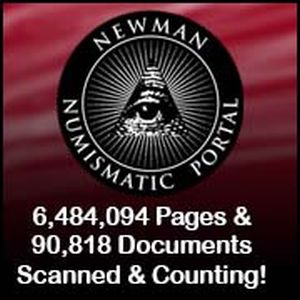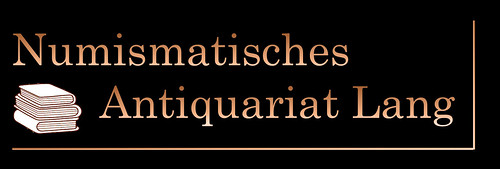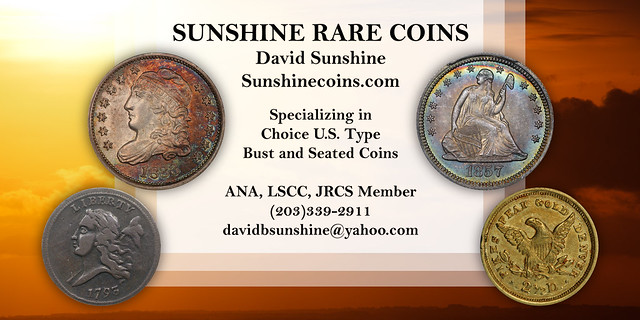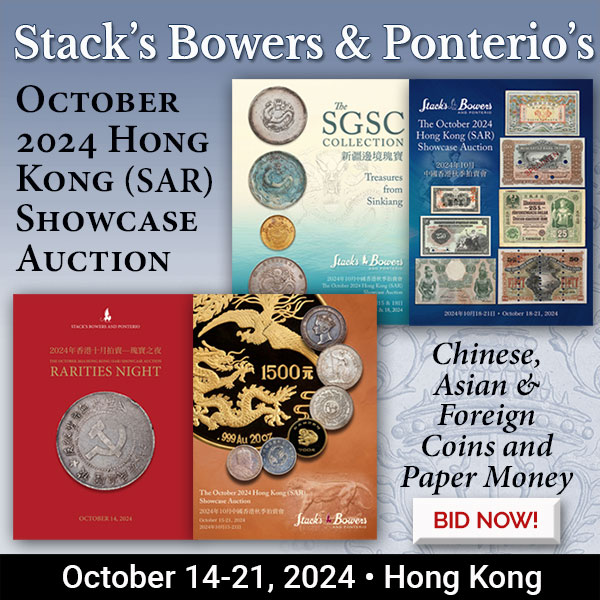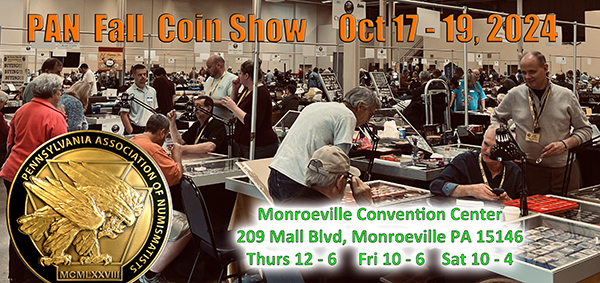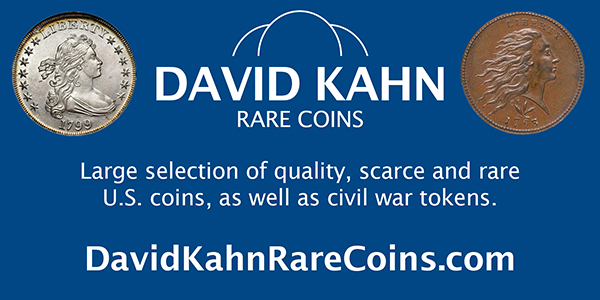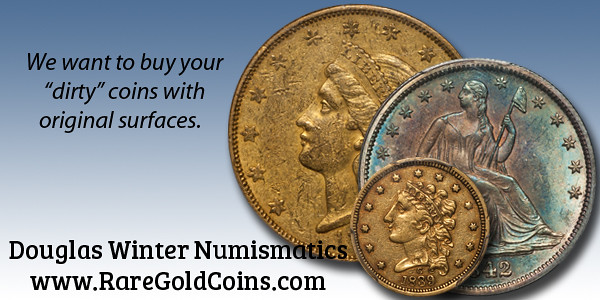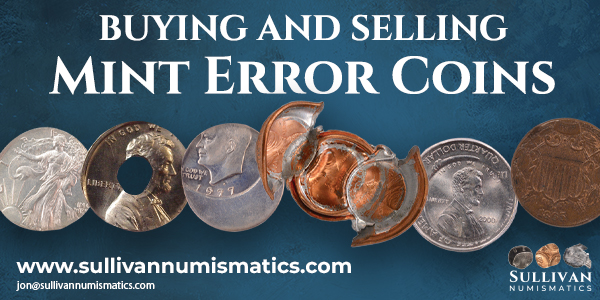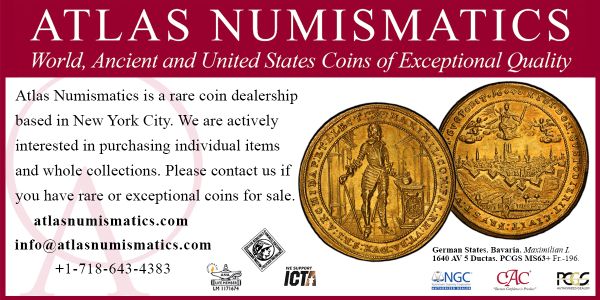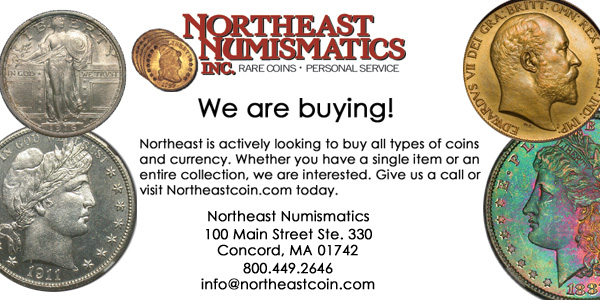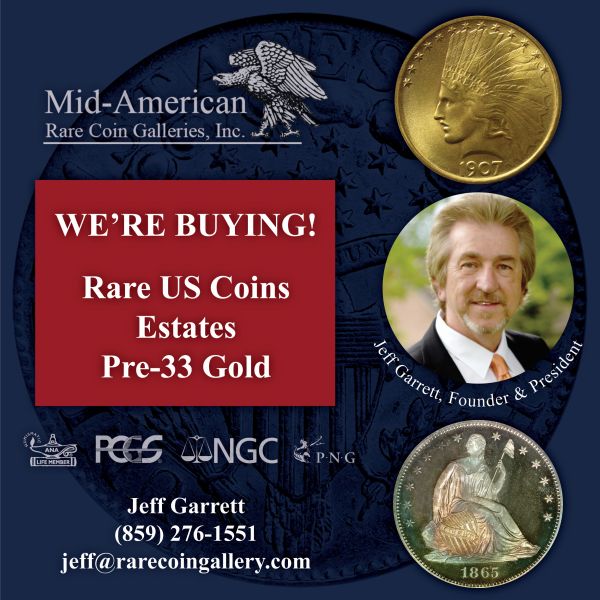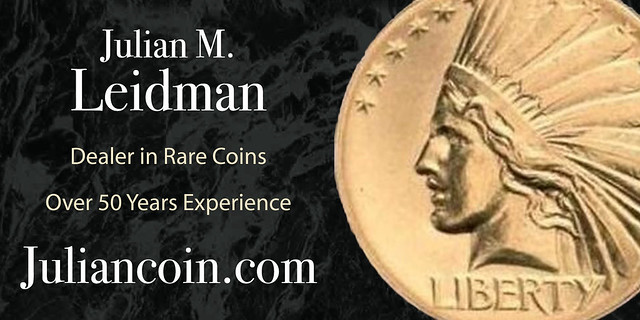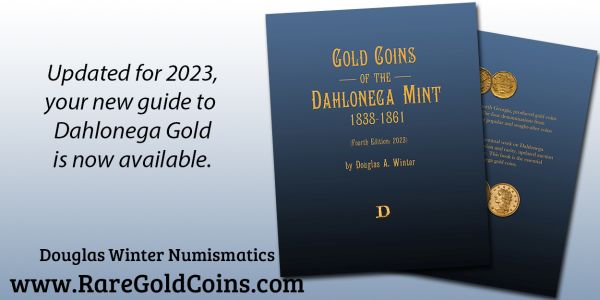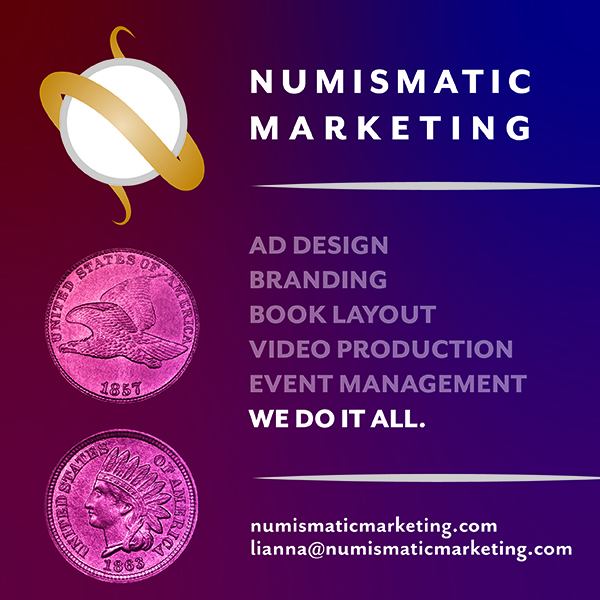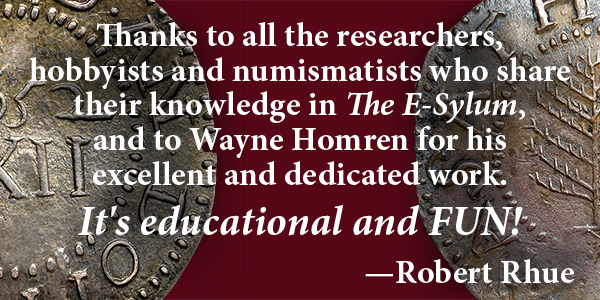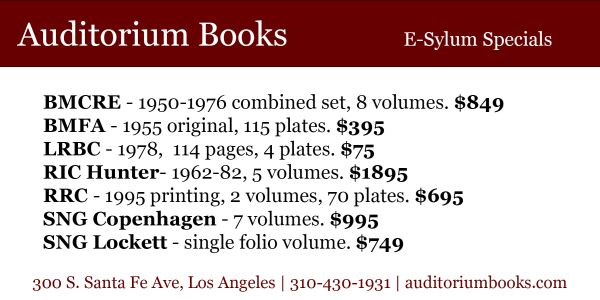
Visit our NBS Sponsors



About UsThe Numismatic Bibliomania Society is a non-profit association devoted to the study and enjoyment of numismatic literature. For more information please see our web site at coinbooks.org SubscriptionsThose wishing to become new E-Sylum subscribers (or wishing to Unsubscribe) can go to the following web page link MembershipThere is a membership application available on the web site Membership Application To join, print the application and return it with your check to the address printed on the application. Print/Digital membership is $40 to addresses in the U.S., and $60 elsewhere. A digital-only membership is available for $25. For those without web access, write to: Jeff Dickerson, Treasurer AsylumFor Asylum mailing address changes and other membership questions, contact Jeff at this email address: treasurer@coinbooks.org SubmissionsTo submit items for publication in The E-Sylum, write to the Editor at this address: whomren@gmail.com BUY THE BOOK BEFORE THE COINSale Calendar
|
- WAYNE'S WORDS: THE E-SYLUM SEPTEMBER 29, 2024
- LANG NUMISMATIC LITERATURE AUCTION 4
- NEW BOOK: PHILIPPINE MEDALS AND TOKENS, 4TH EDITION
- BANKNOTE BOOK NEW ZEALAND CHAPTER PUBLISHED
- BANKNOTE BOOK BUKHARA CHAPTER PUBLISHED
- NEW BOOK: MONEY: A STORY OF HUMANITY
- NEW BOOK: THERE'S TREASURE INSIDE
- NNP UPDATES SOUVENIR CARD JOURNAL
- VIDEO: LIBERTY SEATED HALF DOLLARS
- PIP, SQUEAK AND WILFRED
- MICHAEL HODDER ON JOHN J. FORD, JR.
- NOTES FROM E-SYLUM READERS: SEPTEMBER 29, 2024
- THE LAST PATRIOTIC CIVIL WAR TOKEN?
- THE CINCO PESO TEXAS RANGER BADGES
- ICOMON ANNUAL CONFERENCE 2024
- VOCABULARY TERM: PROCESS SET
- DONALD JOHN MUNIZ
- THE ANDRE DAWSON COLLECTION
- ARNO SAFRAN INTERVIEW, PART THREE
- NENA NEWS CELEBRATES 75TH ANNIVERSARY
- WASTWEET, WARTENBERG HONORED AT ANA BANQUET
- GEOFFREY BELL MEDAL COLLECTION SELECTIONS
- MDC MONACO AUCTION 15, PART ONE
- NICOLAS MAIER MEDAL COLLECTION SELECTIONS
- STACK'S BOWERS TO SELL ROBERT D. REED COLLECTION
- NOONANS SELLS COINS FOUND IN SUFFOLK
- THAT MEDAL ON CAMPBELL'S SOUP CANS
- SCHOOL ART LEAGUE HANEY MEDAL
- THE AIR FORCE ACHIEVEMENT MEDAL
- THE CIA COUNTERFEIT CUBAN BANKNOTES
- LOOSE CHANGE: SEPTEMBER 29, 2024
- THE AMERICAN TOBY JUG MUSEUM
Content presented in The E-Sylum is not necessarily researched or independently fact-checked, and views expressed do not necessarily represent those of the Numismatic Bibliomania Society.
WAYNE'S WORDS: THE E-SYLUM SEPTEMBER 29, 2024
 New subscribers this week include:
Leo Greenberry, courtesy Kerry Wetterstrom;
and Gregoire Peverelli.
Welcome aboard! We now have 7,270 subscribers.
New subscribers this week include:
Leo Greenberry, courtesy Kerry Wetterstrom;
and Gregoire Peverelli.
Welcome aboard! We now have 7,270 subscribers.
Thank you for reading The E-Sylum. If you enjoy it, please send me the email addresses of friends you think may enjoy it as well and I'll send them a subscription. Contact me at whomren@gmail.com anytime regarding your subscription, or questions, comments or suggestions about our content.
This week we open with a numismatic literature sale, five new books and monographs, updates from the Newman Numismatic Portal, notes from E-Sylum readers, and more.
Other topics this week include Philippine medals and tokens, New Zealand banknotes, Souvenir Cards, Liberty Seated coinage, Texas Ranger badges, process sets, Andre Dawson, Arno Safran, Heidi Wastweet, Ute Wartenberg, auction previews, the Robert Reed and John Beck collections, the Air Force Achievement Medal, and counterfeit Cuban banknotes.
To learn more about the D. F. Grotjohann library, Pip, Squeak and Wilfred, George William Wyon, bars with currency as wallpaper, the ICOMON conference, Donald Muniz, NENA News, the Nicolas Maier Collection, the American Toby Jug Museum and that medal on Campbell's soup cans, read on. Have a great week, everyone!
Wayne Homren
Editor, The E-Sylum
LANG NUMISMATIC LITERATURE AUCTION 4
The fourth numismatic literature auction from Numismatic Antiquarian Bookshop Lang closes October 15, 2024. Here's the announcement. -Editor
We are pleased to announce the 4th auction of the Numismatisches Antiquariat Lang on October 15, 2024! This auction offers an incomparable opportunity to bid on an impressive selection of numismatic literature, bibliophile works, auction catalogs and professional journals.
Particularly noteworthy are:
- The D. F. Grotjohann library (lots no. 1-136), focusing on ancient numismatics.
- Selections from the Reinhold Jordan library, with a focus on British numismatics.
NEW BOOK: PHILIPPINE MEDALS AND TOKENS, 4TH EDITION
A new edition of Philippine Medals and Tokens has been published. Here's the announcement. -Editor
 Philippine Medals and Tokens 1780-2024 (4th Edition)
Philippine Medals and Tokens 1780-2024 (4th Edition)
Earl Honeycutt & Sandy Lichauco
The 4th edition of Philippine Medals and Tokens 1780-2024 is now available for US buyers! The 4th edition sports a new format, with more than 2200 medals and tokens presented in rich detail over 343 pages.
The retail price of the book is $110, to include S/H via Media Mail.
Please contact the lead author, Earl Honeycutt, at: ehoneycutt@elon.edu or (919) 357-6160 with the following information:
- Number of books you want.
- Personal Dedication—please provide name(s).
- Preferred method of payment: check/money order, paypal, zelle (routing info will be provided).
- Any questions you may have.
Books will ship Media Mail within 24 hours of confirmed payment.
BANKNOTE BOOK NEW ZEALAND CHAPTER PUBLISHED
The New Zealand chapter of The Banknote Book by Owen Linzmayer has been published by CDN. -Editor
CDN is proud to announce the publication of the complete 117-page catalog covering 1,445 varieties of notes from 14 trading banks from 1840 – 1933, and the Reserve Bank from 1934 to present.
BANKNOTE BOOK BUKHARA CHAPTER PUBLISHED
But wait, there's more! A chapter of The Banknote Book on notes of Bukhara, Uzbekistan has been published as well. -Editor
CDN is proud to announce the initial publication of the complete 23-page catalog covering notes issued from 1918 – 1922.
NEW BOOK: MONEY: A STORY OF HUMANITY
I'm a "big picture" guy, and enjoy books that take the big, long view of how money came to be, as a way of better understanding the money artifacts we collect - coins, tokens and paper money. Here's a new one by economist David McWilliams, touching on topics of trade, science, art and philosophy and ranging from tally sticks to today’s cryptocurrency. Here's the Amazon description and an excerpt from a review by The Guardian. -Editor
 Money: A Story of Humanity
Money: A Story of Humanity
David McWilliams
Publisher: Simon & Schuster Ltd
ISBN: 9781471195433
Number of pages: 416
Dimensions: 234 x 153 x 30 mm
In this groundbreaking book, renowned global economist David McWilliams unlocks the mysteries and the awesome power of money: what it is, how it works, and why it matters.
The story of money is the story of our desires, our genius, and our downfalls. Money is power—and power beguiles. Nothing we’ve invented as a species has defined our own evolution so thoroughly and changed the direction of our planet’s history so dramatically. Money has shaped the very essence of what it means to be human. We can’t hope to understand ourselves without it. And yet despite money’s primacy, most of us don’t truly understand it. As economist David McWilliams states, money is everything. "Money defines the relationship between worker and employer, buyer and seller, merchant and producer. But not only that: it also defines the bond between the governed and the governor, the state and the citizen. Money unlocks pleasure, puts a price on desire, art and creativity. It motivates us to strive, achieve, invent and take risks. Money also brings out humanity’s darker side, invoking greed, envy, hatred, violence and, of course, colonialism." Money isn’t just paper or coins or virtual currency. Money is humanity.
NEW BOOK: THERE'S TREASURE INSIDE
I guess the world hasn't learned from the Forrest Fenn debacle, where multiple people put themselves in danger searching the outdoors in a nationwide treasure hunt. Here's a copycat book enticing readers into a similar adventure. -Editor
 A North Carolina native decided to spend millions of dollars purchasing various treasures. But instead of keeping the items for himself or donating them to a museum or educational institution, Jon Collins-Black divided them into five boxes and hid them across the United States.
A North Carolina native decided to spend millions of dollars purchasing various treasures. But instead of keeping the items for himself or donating them to a museum or educational institution, Jon Collins-Black divided them into five boxes and hid them across the United States.
Only he knows where the items are stashed, but he’s inviting anyone to search for them. Treasure hunters will find clues to the boxes in Collins-Black’s new book, "There’s Treasure Inside," available now for pre-order.
Now living in California, the University of North Carolina at Chapel Hill alumnus spoke with The News & Observer about his story and latest project.
NNP UPDATES SOUVENIR CARD JOURNAL
Issues of the Souvenir Card Journal are the latest additions to the Newman Numismatic Portal. Project Coordinator Len Augsburger provided the following report. Thanks. -Editor
Souvenir Card Collectors Society Updates Journals on Newman Portal
The Souvenir Card Collectors Society (SCCS) promotes the study and collecting of souvenir cards, which are typically issued to mark special occasions and are printed on high quality card stock using intaglio methods (steel plate engravings). SCCS maintains a catalog of souvenir cards and further publishes the Souvenir Card Journal, which is currently in its 44th year. The SCCS has recently extended its run of back issues on Newman Portal, and these are now available through the year 2018.
VIDEO: LIBERTY SEATED HALF DOLLARS
The David Lisot Video Library on the Newman Numismatic Portal can be found at:
https://nnp.wustl.edu/library/multimediadetail/522852
We highlight one of his videos each week in The E-Sylum. Here's one from 2009 with Bill Cowburn seaking about Liberty Seated Half Dollars. -Editor
PIP, SQUEAK AND WILFRED
Last week Pete Smith posed two questions for our readership about certain World War I service medals. -Editor
Neil Burns writes:
"Regarding the question on First World War British medals, they were commonly called Pip, Squeak and Wilfred after a popular comic strip trio of the time.
"I don't recall seeing any silver and red ribbons on First World War British medals nor can I find a reference to them being issued in those colors. My guess would be it was substituted by the recipient after being issued."
MICHAEL HODDER ON JOHN J. FORD, JR.
Mike Hodder worked for many years with John Ford, and he offers these thoughts on Ford's methods. Thank you!! -Editor
 I guess I'd better chime in on this. Ford wasn't stingy with numismatic information, he was cagey. Remember, he was a businessman as well as a collector. In areas he was actively interested in, like Betts medals, he did himself no good telling potential competitive bidders what he had and what he wanted. In areas he was less active in, like currency or 19th C. U.S. Mint medals (always excepting Indian Peace Medals), he shared what he knew with anyone he respected who asked for it, like Carl Carlson and Doug Ball, for examples. It always helped if that person wasn't likely to be a competitor for something Ford wanted, too!
I guess I'd better chime in on this. Ford wasn't stingy with numismatic information, he was cagey. Remember, he was a businessman as well as a collector. In areas he was actively interested in, like Betts medals, he did himself no good telling potential competitive bidders what he had and what he wanted. In areas he was less active in, like currency or 19th C. U.S. Mint medals (always excepting Indian Peace Medals), he shared what he knew with anyone he respected who asked for it, like Carl Carlson and Doug Ball, for examples. It always helped if that person wasn't likely to be a competitor for something Ford wanted, too!
In other areas where his collections were largely static, like state coppers or Massachusetts silver, Ford gave a trusted few full access to his collections. When I first went to his house in Phoenix to study his New Jersey's for my own research interests I found Breen had already been there before me, given the same unrestricted right to examine the collection. I found Breen's notes again when I worked on Ford's Vermonts and Connecticuts.
NOTES FROM E-SYLUM READERS: SEPTEMBER 29, 2024
George William Wyon
Daniel Fearon writes:
 "Last week’s E-Sylum illustrates the memorial medal to George William Wyon, engraver at the Royal Mint, who died aged only 26. It is thought he was working on the Canadian - New Brunswick coins at the time of his death. In Hard at Work. The Diary of Leonard Wyon 1853–1867, edited by Philip Attwood, 2014 (Available from Spink & Son), the entry for the day reads:-
"Last week’s E-Sylum illustrates the memorial medal to George William Wyon, engraver at the Royal Mint, who died aged only 26. It is thought he was working on the Canadian - New Brunswick coins at the time of his death. In Hard at Work. The Diary of Leonard Wyon 1853–1867, edited by Philip Attwood, 2014 (Available from Spink & Son), the entry for the day reads:-
"March 27th 1862, "I went this afternoon to the Mint in consequence of a letter I received from Mary Wyon telling me of the increased illness of her brother George. He was too ill to see me. I took with me 2 bottles of port, 1 of rum, and some jelly. We dined at the Bartons."
"March 28th. "Early this morning George Wyon died. We went in the evening to tea at the O’Neills."
"I can only hope that the port, rum and jelly didn’t go to waste!
"For anyone with an interest in the Wyons, the Royal Mint and Victorian coinage, war medals and medallions, I thoroughly recommend the book."
Sounds interesting. Thank you. -Editor
To read the earlier E-Sylum articles, see:
MEDALLIC MEMENTO OF GEORGE WILLIAM WYON
(https://www.coinbooks.org/v24/esylum_v24n30a23.html)
NEW BRUNSWICK TRIAL AND PATTERN SET
(https://www.coinbooks.org/v27/esylum_v27n38a24.html)
Other topics this week include Bars With Currency as Wallpaper. -Editor
THE LAST PATRIOTIC CIVIL WAR TOKEN?
Thomas Lovelace submitted these thoughts on an enigmatic piece. -Editor
IMHO this is probably the last patriotic civil war token made. Since I can't find this token listed anywhere, I am left speculating. One side shows a 36 star flag, which would indicate that the issue corresponded with the admission of Nevada as the 36th state, which occurred in October, 1864. The US flag is modified only on July 4th of each year, so an official 36 stag flag would have been made in July, 1865. 36 star flags have a pattern of stars in a circle, so the pictured flag with 36 stars in a square would indicate a date for this token that most likely predates the official flag, possibly even slightly predating the admission of Nevada as a state. While private issues of coins became illegal in July, 1864, the maker of this token probably was not aware of that law being passed. Lord knows I can't keep up with all the new laws being passed.
THE CINCO PESO TEXAS RANGER BADGES
Chriss Hoffman writes:
"Every Texas Ranger badge is made from a silver Mexican Coin from the old days up to present day."
Interesting! How come I never heard of these before? Chriss provided a webpage with information. Thanks! -Editor
 When is a Cinco Peso coin not a coin? When it’s a Texas Ranger badge.
When is a Cinco Peso coin not a coin? When it’s a Texas Ranger badge.
Before Walker, Texas Ranger started coming into our homes with a badge as big as our television screen, we have known about this elite law enforcement group. Known for toughness and fairness, Texas Rangers protected the earliest settlers of Texas (maybe numbering in the hundreds) and they continue to protect over 29 million of the 21st century residents of Texas. They are a point of pride in the state of Texas.
ICOMON ANNUAL CONFERENCE 2024
Ben Hellings of Yale and Cecilia von Heijne of the Economy Museum - Royal Coin Cabinet of Sweden co-organized this past week's ICOMON conference in Stockholm, Sweden. Here's some information on the program. A video of the conference talks will be uploaded soon. See the link below for abstracts and other conference information. -Editor
The Economy Museum – Royal Coin Cabinet in Stockholm will host the International Committee for Money and Banking Museums (ICOMON) 30th Annual Conference on 25-28 September 2024, in collaboration with ICOMON and International Numismatic Council.
VOCABULARY TERM: PROCESS SET
Here's another entry from Dick Johnson's Encyclopedia of Coin and Medal Terminology. I added images provided by Skip Lane for an earlier E-Sylum article on the topic. -Editor
Process Set. Sample specimens of a multiple-struck medal selected from various stages of manufacturing to illustrate the physical change from raw metal to completed art medal. The set of medals are always shown together, often for a display for most dramatic effect. The first recorded showing of such a process set was by Tiffany & Co. in 1901 at the Buffalo Pan-American exposition where the jewelry firm displayed a process set of the Dewey Manila Bay Medal of 1898 among 196 medals the firm had manufactured since 1851.
DONALD JOHN MUNIZ
E-Sylum Feature Writer and American Numismatic Biographies author Pete Smith submitted this article on dealer and onetime coin columnist Donald Muniz. Thank you. -Editor
 This week I took on research for another coin columnist, Donald J. Muniz. I found out a few
interesting things about the first half of his life but the second half remains a mystery.
This week I took on research for another coin columnist, Donald J. Muniz. I found out a few
interesting things about the first half of his life but the second half remains a mystery.
I started with his listing in the 1950 Census when he was five years old. He was living in Rutherford, New Jersey, with his father, Ricardo Muniz, his mother Lydia Muniz and his fourteen-year-old brother Richard. Ricardo was manager of the television receiver manufacturing division of the Allen B. DuMont Laboratories, Inc.
Donald John Muniz was married to Phyllis Nancy November on August 28, 1966. They had a daughter. In 1967, Donald J. Muniz graduated from Monmouth College with a B. A. degree in government.
Ricardo, the father, joined the A.N.A. in 1943 as member 9513. Richard, the son, joined the A.N.A, in 1960 as member 35455. In 1962, Ricardo joined Richard in his coin business in Miami. Donald J. Muniz joined the A.N.A. in 1969 as member R-83581. It was about that time that he joined his brother in the business.
THE ANDRE DAWSON COLLECTION
We sometimes discuss celebrity coin collectors - most recently, the late James Earl Jones. Jeff Pritchard published a nice article in the latest issue of The E-Gobrecht from the Liberty Seated Collectors' Club. With permission, we're publishing a excerpt. Thank you. -Editor
(Reflections on the Andre Dawson Collection)
 In September of 1998, I chanced to purchase two Seated Liberty quarters (1863 – MS66 & 1882 – MS67) from Heritage’s sale of the Andre Dawson collection. Recently, the pedigree of these two coins, which I still own, combined with this being the height of baseball season, piqued my interest to look back at the man and his collection.
In September of 1998, I chanced to purchase two Seated Liberty quarters (1863 – MS66 & 1882 – MS67) from Heritage’s sale of the Andre Dawson collection. Recently, the pedigree of these two coins, which I still own, combined with this being the height of baseball season, piqued my interest to look back at the man and his collection.
In 1998, Andre Dawson had recently retired from Major League Baseball, predominately playing for the Montreal Expos and the Chicago Cubs. During his 22-year career, Dawson generated eye-popping statistics – 438 home runs, 1,591 RBIs, 314 stolen bases, and 8 All-Star appearances. But Dawson also underwent a staggering 12 knee surgeries during his career, and before non-invasive orthoscopic surgical methods were available: testimony to his toughness, perseverance, and love of the game. In 2010, Cooperstown recognized his athletic prowess, inducting Dawson into the Baseball Hall of Fame.
But Andre Dawson was also an all-star coin collector! My two quarters from his collection were but a small sampling of his beautiful, high-quality type set that included 24 Liberty Seated pieces. Many of Dawson’s carefully selected coins are still among the finest known specimens. His condition census pieces included: 1869 Half-Dime – MS68 NGC; 1859 Half-Dime – PF67 NGC; 1874 Dime (w/Arrows) – MS68 NGC; 1854 Quarter (w/Arrows) – MS67 NGC; 1854 Half-Dollar (w/Arrows) PF66 NGC; and an 1863 Dollar – MS67 NGC.
ARNO SAFRAN INTERVIEW, PART THREE
Greg Bennick's latest interview for the Newman Numismatic Portal is with collector and author Arno Safran. Here's the third part, where Arno talks about some of his favorite coins and the clubs he belongs to. -Garrett
GREG BENNICK: Oh, that's great. Now, what other coins were favorites of yours that you owned in your collection?
GREG BENNICK: Yeah.
ARNO SAFRAN: Well, that's one of them that you just heard me talk about [an 1825 dime].
GREG BENNICK: For sure. Absolutely. Understandably so.
ARNO SAFRAN: I have a lot. It's hard to answer that question, you know, shortly. I do articles now supporting Charles Barber. I mean, he came in a time which was the end of the entire beginning of numismatics in America. And he was old hat. But you have St. Gaudens and all his, disciples doing magnificent stuff with coins, a brand-new modern music like this and modern coins. And so, he was considered the no-no.
NENA NEWS CELEBRATES 75TH ANNIVERSARY
The New England Numismatic Association (NENA) periodical NENA News has been published for 75 years. Congratulations! The club is celebrating with a banquet at their upcoming New Hampshire Coin and Currency Expo, held on October 25-26, 2024. Guest speakers for the event will be Jeff Garrett and Chris Costello. Here's the announcement. -Editor
Celebrating 75 years of New England Numismatic Association (NENA) News - Join Us for a Dinner Banquet Celebration
 The New England Numismatic Association (NENA) is excited to announce a special dinner banquet celebrating 75 years of NENA News. The banquet will take place on October 25, 2024, at the Doubletree Hotel, located at 700 Elm St. Manchester, NH, from 6:30 PM to 10:00 PM. Tickets are on sale now for $75 ea. at
https://nenacoin.org/shop
.
The New England Numismatic Association (NENA) is excited to announce a special dinner banquet celebrating 75 years of NENA News. The banquet will take place on October 25, 2024, at the Doubletree Hotel, located at 700 Elm St. Manchester, NH, from 6:30 PM to 10:00 PM. Tickets are on sale now for $75 ea. at
https://nenacoin.org/shop
.
This event promises an evening of camaraderie, reflection and celebration as we honor the history and contributions of NENA News to the numismatic community. Guests will enjoy a delightful dinner, engaging speeches and the opportunity to connect with fellow numismatists and enthusiasts. According to President Whitehouse, "Through volunteerism and education NENA connects fellow enthusiasts and promotes collecting coins and currency in New England and beyond. We are very excited to celebrate this 75-year milestone of NENA News with our strong and growing numismatic community."
WASTWEET, WARTENBERG HONORED AT ANA BANQUET
This ANA press release highlights two very deserving awardees honored at this year's convention banquet. -Editor
During last month's American Numismatic Association's (ANA) World's Fair of Money, hosted in Chicago, members who have contributed to the hobby in profound ways were recognized. The Numismatic Art Award for Excellence in Medallic Sculpture and the Burnett Anderson Memorial Award for Excellence in Numismatic Writing were presented during the 133rd Anniversary Awards Banquet.
 The ANA's Numismatic Art Award for Excellence in Medallic Sculpture is an annual honor given to an artist whose lifetime work in the field rises above all others. The 2023 recipient is Heidi Wastweet, a leading American medalist and sculptor who specializes in bas-relief, from cast and struck medals to public monuments. She was chief engraver for Sunshine Mint for 11 years and lead designer/sculptor for Global Mint for five years. In her work with a variety of private mints, Wastweet has produced over 1,000 coins, medals, and tokens. In 2001 she opened her own studio. Her work tends to be symbolic and often depicts the human figure in a contemporary and representational style. She has trained over a dozen artists to be medallic sculptors and conducts workshops. Wastweet served on the U.S. Mint's Citizens Coinage Advisory Committee from 2010 to 2018 and currently is president of the American Medallic Sculpture Association.
The ANA's Numismatic Art Award for Excellence in Medallic Sculpture is an annual honor given to an artist whose lifetime work in the field rises above all others. The 2023 recipient is Heidi Wastweet, a leading American medalist and sculptor who specializes in bas-relief, from cast and struck medals to public monuments. She was chief engraver for Sunshine Mint for 11 years and lead designer/sculptor for Global Mint for five years. In her work with a variety of private mints, Wastweet has produced over 1,000 coins, medals, and tokens. In 2001 she opened her own studio. Her work tends to be symbolic and often depicts the human figure in a contemporary and representational style. She has trained over a dozen artists to be medallic sculptors and conducts workshops. Wastweet served on the U.S. Mint's Citizens Coinage Advisory Committee from 2010 to 2018 and currently is president of the American Medallic Sculpture Association.
GEOFFREY BELL MEDAL COLLECTION SELECTIONS
Part 1 of the Geoffrey Bell Collection is featured in the Geoffrey Bell Auctions Toronto Coin Expo 2024 Fall Sale on October 4th. Here are some lots that caught my eye. -Editor
Lot 428: Lr. 490 — George III Hudson's Bay Company Indian Peace Medal. Undated (1820). Copper. Breton-181, Jamieson-20, Obverse of BHM-991 and 1062, Similar to Eimer-1120, but obverse legend and signature are different. 48.0mm. 44.7g. Plain edge. Signed C.H.K. This example employs a different obverse than the previous lot, the most notable variations being the legend and signature. The same reverse die break occurs at 12 o’clock, though it appears to be in a slightly earlier stage. Each side displays clean proof-like surfaces with substantial field reflectivity and elements of violet, blue, and golden colour. Original shell case is included along with an old paper wrapper.
Ex: Toronto Coin Expo Fall Sale (Geoffrey Bell Auctions, 9/2013), lot 282N, realized $3,600.
THE BOOK BAZARRE
MDC MONACO AUCTION 15, PART ONE
Here's the first part of the announcement for MDC Monaco's Auction 15. -Editor
We are very happy to announce our 15th Numismatic Auction. The auction will take place on the 23rd and 24th of October 2024. We will present, on this occasion, and among French and world coins, four exceptional collections. The Stephane Gouffault Collection, the Nicolas Maier Collection, the second part of The Collection of an American Gentleman (also known as "The French Collection"), and the X Collection, selection of barbarian coins.
NICOLAS MAIER MEDAL COLLECTION SELECTIONS
The medal collection of author Nicolas Maier is coming up for sale at MDC Monaco. At my request he selected eight lots which are among his personal favorites. Thank you - great medals. NOTE: the descriptions have been machine-translated from French to English. -Editor
FRANCE - FRANCE. Third Republic (1870-1940). Medal, to the poets without glory by Louis Botte, SAMF No. 83 1905, Paris. Av. TO THE POET WITHOUT GLORY. In a cemetery setting, Allegory of poetry on the right, veiled, holding a harp girded with a crown of epines, and a crown; signature LOVIS BOTTEE 1904. Rv. On the grave slab of a poet hang various figures bearing attributes such as a theater mask, a mirror or a veil, in the foreground Venus with flowers and a Love with its quiver, in the background, Chronos with its false; signature LOVIS BOTTEE. Maier 33; Bronze - 255g - 90mm - 12h. From the collection of Nicolas Maier. On the edge punches (horn) BRONZE (lizard) and number 83. Only 120 copies minted in bronze and distributed to members of the Society of Friends of the French Medal. A small blow under the harp to the right. Nice patina. Superb in Corner Flower.
To read the complete item description, see:
FRANCE - FRANCE.
Third Republic (1870-1940). Medal, to the poets without glory by Louis Botte, SAMF No. 83 1905, Paris.
(https://www.biddr.com/auctions/mdcmonaco/browse?a=4938&l=5984779)
STACK'S BOWERS TO SELL ROBERT D. REED COLLECTION
This press release announces the sale of the Robert D. Reed Collection of U.S. Coins in the Stack's Bowers November 2024 Showcase Auction. -Editor
Stack’s Bowers Galleries is proud to announce that it will be offering the Robert D. Reed Collection of United States Coins in their November 2024 Showcase Auction. Featuring over 100 gold coins that include early United States Mint issues and a world-class selection of Territorial gold, the Reed Collection was assembled in the 1980s and 1990s and is entirely fresh to the market. Collectors will have the opportunity to acquire these treasures for the first time in decades as part of the Stack’s Bowers Galleries November 2024 Official Auction of the Whitman Coin & Collectibles Winter Expo.
Robert "Bob" Reed’s love of collecting perhaps started as a child when he collected toy soldiers and cowboys – items still in his possession when he passed away in May 2024. Bob grew up outside of Newark, New Jersey before his family finally settled in Ponte Vedra Beach, Florida. Soon after that move, he left college to join the United States Army serving a tour in Vietnam. When he returned from the war, he began working for the family business and soon took over the company after his father passed away.
NOONANS SELLS COINS FOUND IN SUFFOLK
Aaron Oppenheim passed along this article about the sale of a Roman coin hoard found by a metal detectorist in Suffolk, England. Thanks. -Editor
... George Ridgway found a collection of more than 680 gold and silver coins with his metal detector in September 2019, according to a press release from Noonans Mayfair, the London-based auction house responsible for the sale of the coins.
The coins were discovered with a metal detector in the grounds of Helmingham Hall near Stowmarket in Suffolk.
THAT MEDAL ON CAMPBELL'S SOUP CANS
Matt Campbell edits The Clarion for the Pennsylvania Association of Numismatists. He contributed an article to the Fall 2024 issue on a medal everyone has seen but few have noticed - the one on the label of Campbell's soup cans. With permission, we're republishing it here. Thank you! -Editor
It took more than 10 years as a numismatist and who knows how many cans of tomato or cream of mush room soup over many more years than that to notice a small medal on the Campbell’s soup can label. The medal’s reverse has generally adorned the red and white Campbell’s soup cans since the 1900 Paris Exposition, where the company won a bronze medal for product excellence for its condensed soup. The iconic company invented the process to condense soup in 1897, making soup more economical for the public and revolutionizing the soup business.
SCHOOL ART LEAGUE HANEY MEDAL
Jim Haas submitted this article on the uniface School Art League of New York's Haney Medal for Fine Arts, designed by John Flanagan. Thank you! Medal image from Stack's Bowers Galleries March 2020 Auction. From the Richard Jewell Collection. -Editor
As was the Saint-Gaudens Medal, the Haney Medal for Fine Arts was endowed in perpetuity and named for James Parton Haney. Born on April 16, 1869 in New York City, he began his career in education in 1890, taught manual arts in the city’s night schools and in time, became the first director of art in the high schools with a corps of fifty art teachers. In 1907 he had organized the art department of the NYU summer school for the training of art teachers.
 On June 10, 1915 it was announced that recently deceased artist John W. Alexander (1855-1915) had gifted a bronze medal to the New York City Art League. It was to be awarded for proficiency in art in January and June at the close of the school year in each of the city’s then 23 high schools. Shortly after the announcement, the names of the students awarded the 2¾" medal designed by sculptor and medalist John Flanagan were published in city newspapers. Haney was quoted as saying "The aid which this medal will render is invaluable." One journal published a photo.
On June 10, 1915 it was announced that recently deceased artist John W. Alexander (1855-1915) had gifted a bronze medal to the New York City Art League. It was to be awarded for proficiency in art in January and June at the close of the school year in each of the city’s then 23 high schools. Shortly after the announcement, the names of the students awarded the 2¾" medal designed by sculptor and medalist John Flanagan were published in city newspapers. Haney was quoted as saying "The aid which this medal will render is invaluable." One journal published a photo.
John White Alexander was largely instrumental in the establishment of the School Art League in 1911. He was named its first president and James P. Haney was named first vice-president. One of the organization’s objectives was to enhance the art education curriculum in public schools. Providing more talented students with a wider range of opportunities such as museum-sponsored lectures was one means; exposure to art schools for those interested in advanced training, another. Hermon MacNeil, who supported establishing free scholarships in industrial art for high school graduates, was appointed to a three-year term serving on the Society’s Board of Managers. One year after Alexander’s death, MacNeil was asked to design a plaque in his honor. He inscribed the piece Gifted with Sweeping Imagination and an Ever Ready Judgement Painter Creator Organizer Leader.
THE AIR FORCE ACHIEVEMENT MEDAL
There are lots of medals awarded each year, and most don't have the name recognition of the Nobel prize or Olympics. But they're just as important to the people involved. Here's the story of one worthy recipient of the Air Force Achievement Medal. -Editor
U.S. Air Force Airman 1st Class Troy May, 62d Aircraft Maintenance Squadron heavy aircraft integrated avionics specialist, holds his Air Force Achievement Medal at Joint Base Lewis-McChord, Washington, Sept. 13, 2024. May received this commendation after carrying a woman who had just broken and dislocated her ankle the majority of 1.6 miles down a steep hiking trail and assisting her to a hospital.
THE CIA COUNTERFEIT CUBAN BANKNOTES
An article by Roberto Menchaca in the Sep/Oct 2024 issue of Paper Money from the Society of Paper Money Collectors presents new evidence about the CIA Counterfeit Cuban banknotes of 1961. With permission, we're publishing this excerpt. Thank you! -Editor
COUNTERFEIT CUBAN BANKNOTES OF 1961
A commonly accepted idea is that a series of Cuban banknotes of 1961 with nominal value of twenty pesos were produced by the CIA and given to the members of the Cuban Assault Brigade that attempted to overthrow Fidel Castro during the ill-fated Bay of Pigs Invasion to the island of that year. The topic has been treated with some detail over the years by both, Cuban and foreign specialists. Most sources indicate that each soldier was given approximately one-hundred of these forged notes to be carried to Cuba for purchasing supplies from the peasants and/or bribery (Quesada, 2009; Wayne, 2011). Using essentially the same description, some of these notes have been sold over the years by the most prestigious numismatic auction houses reaching always considerable prices.
LOOSE CHANGE: SEPTEMBER 29, 2024
Here are some additional items in the media this week that may be of interest. -Editor
I'm happy when see a popular press article that gets numismatic facts straight, I still cringe at clickbait text that surrounds them. I recently came across this article that explained "why coins have ridges – and it's blowing people's minds." Yeah, right. -Editor
A coin collector has claimed to have discovered the reason why all UK coins have ridges on their sides - and it goes all the way back to the 17th century.
A TikTok user has disclosed that there's a crafty rationale behind it. One user of the site known as @CoinCollectingWizard, who boasts 191,000 followers, shared the intriguing factoid in a video that racked up hundreds of likes alongside numerous comments. He asserted that historically, coins were composed of gold or silver and were devoid of ridges.
He explained that the intrinsic value of each coin correlated directly to its gold or silver content. However, he highlighted that certain individuals tried their hand at an unlawful scheme with these coins.
"They filed off the edges and sold them for their value in gold or silver," he added in the video.
In a bid to curb this malpractice, governments initiated the practice of milling or adding grooves to the edges, ensuring any tampered coins would be immediately recognisable.
That's not a mind-blowing revelation. Congratulations for discovering a fact that's been known to collectors for centuries. But for 191,000 TikTok followers? Maybe not. Those are quite impressive audience numbers, which is why I encourage legitimate coin organizations, collectors and dealers to get out there in the social media realm and promote numismatics. The real facts are plenty interesting without extraneous puffery. -Editor
To read the complete article, see:
Brits are just why coins have ridges – and it's blowing people's minds
(https://www.plymouthherald.co.uk/news/uk-world-news/brits-just-coins-ridges--9536172)
Other topics this week include the Mutilated Coin Redemption Program, the world's largest gold bars, and China’s influence in Africa as shown on seven banknotes. -Editor
THE AMERICAN TOBY JUG MUSEUM
In the other-things-people-collect department, Len Augburger passed along this great Chicago Tribune article about the soon-to-be-closed American Toby Jug Museum. -Editor
Len writes:
"The article raises universal questions for collectors and curators:
- How do you dispose of a lifetime accumulation of a niche collectible?
- What happens to a collection when the family has no interest in it?
- Once you document it, how much value does the physical object have?
- How do you operate a museum with few visitors?

